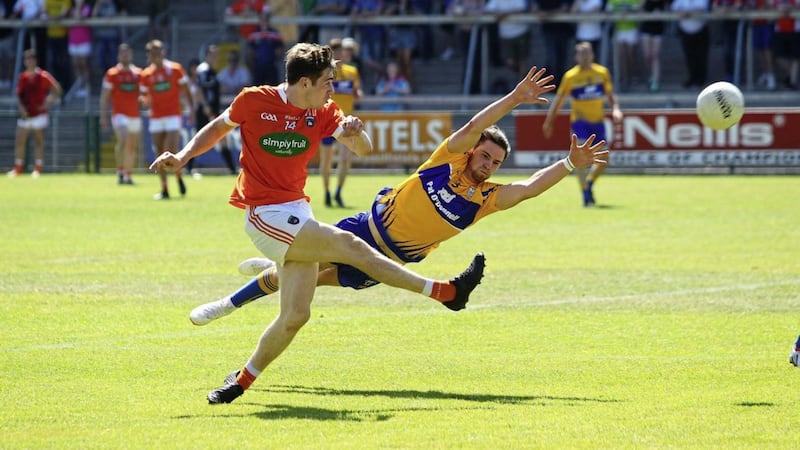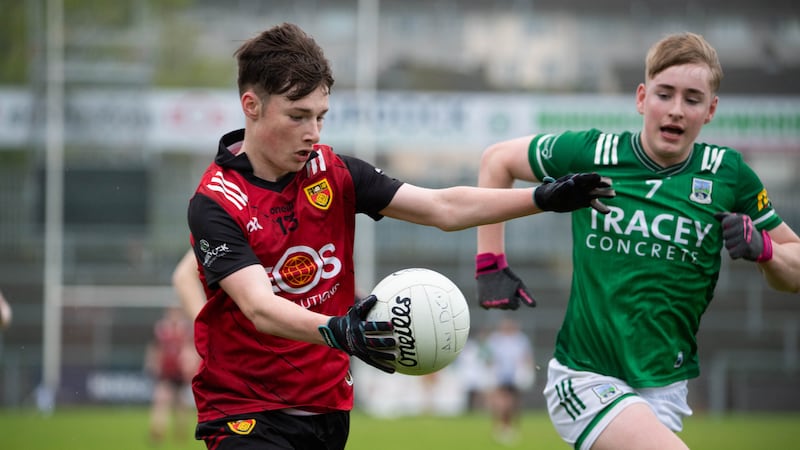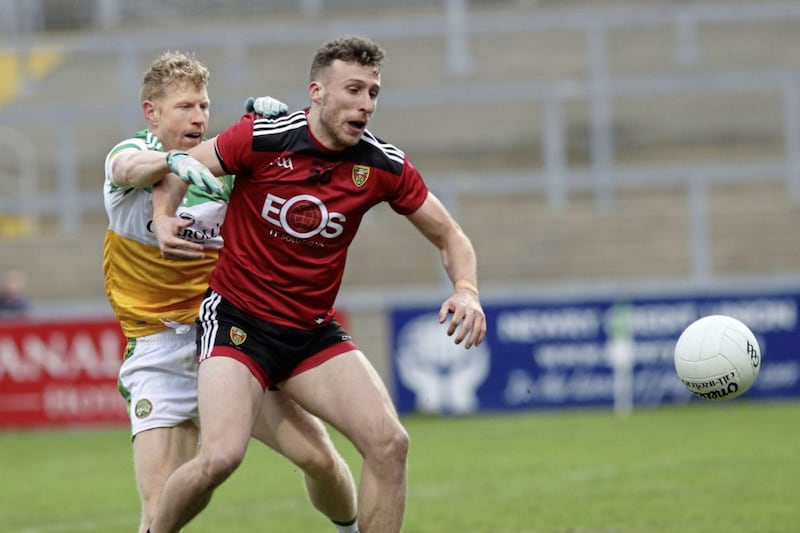WALK 500 yards up the road from St Peter’s Chapel in Lurgan and you’ll arrive in Clan na Gael’s Shankill heartland. Go a little further in the opposite direction from the same starting point and you’ll find yourself in the St Paul’s stronghold of Taghnevan.
Bragging rights and silverware are at stake on Sunday when these neighbours from GAA-mad Lurgan (also home to Clann Eireann and St Peter’s with Sarsfields and the Wolfe Tone’s not far away) meet in the Armagh Intermediate Championship final.
Nowadays the clubs are well-matched sparring partners but there was a time, almost half-a-century ago now, when that would have been unthinkable. Back then it was very much a case of master (Clan na Gael) and apprentice and the fledgling St Paul’s club were grateful of a helping hand from their then illustrious neighbours to help them get going.
When St Paul’s was founded in the newly-built Taghnevan estate in 1971, Clan na Gael (known locally as ‘the Clans’) were the Armagh senior champions.
Their success was built on a three in-a-row-winning minor side that included future Armagh stars in Jimmy Smyth and Colm McKinstry and those two were in the team when the Clans’ first senior championship title since 1950 was captured in 1968.
Over the next decade and-a-half Clan na Gael became established as kings of the Orchard County.
“It shows you the strength of the club that they took a rule out back then that if you didn’t train you didn’t play,” says Smyth, winner of nine senior championship medals, the Armagh skipper in the 1977 All-Ireland final and then a popular GAA commentator on BBC.
“Three or four of the established players who didn’t train, so in the 1969 final we had a 15 year-old - Mickey Tolan - in goals. It was a team built around the minors. People were shocked at the team we put out but we won the game (against Crossmaglen) by a rather large margin (2-6 to 0-4).”
And success followed success. The Clans won the 1971 final without kicking a ball because Carrickcruppen objected to the choice of referee and refused to play (something not unheard of in those days) and it turned out to be the first of a four in-a-row.
“We beat Maghery in the final in 1976 and we shouldn’t have won the game,” Smyth recalls.
“Maghery should have beaten us but they couldn’t score and we won by a couple of points. I remember that match more than any because we were dandering off the field because we’d won it again and there were the Maghery players standing with the tears tripping them.
“They were boys I knew and I remember using that experience when I was manager in 1980 and ’81. I said to the boys: ‘Never take a championship lightly’.
“You can never underestimate a championship win at any level because they don’t come along too easy as we have discovered! We haven’t been in a final since 2006 and that’s not good.”
St Paul’s clubmen must have looked on enviously as trophy after trophy arrived across the town. But in time-honoured GAA tradition, the Clans gave them a helping hand to get established and even contributed to the price of their first kit.
Smyth explains: “I started teaching in St Paul’s in Lurgan in 1971 and Clem McCavigan (St Paul’s clubman) asked me if I could get them a set of jerseys.
“The colours St Paul’s play in are the Offaly colours (green, white and gold) because Offaly won the All-Ireland in 1971. Pat Doyle came down with a set of jerseys and he threw them in an O’Neills ball as well.
“I told Clem: ‘Make sure you collect those jerseys every week’ but the next time I went into our changingrooms at school it was like being in Tullamore!”
The St Paul’s youngsters took their new club jerseys home with them but they wore them proudly when they took the field. The new club had originally set its sights on underage football only but it wasn’t long before they broke through that glass ceiling.
The emergence of Jim McCorry, Mickey McDonald (uncle of Rory McIlroy) and Kieran McNally propelled them onto the senior stage.
From humble beginnings St Paul’s made rapid progress, winning the Armagh Junior Championship in 1978, the intermediate title six years later and then, in 1989, they reached the final of the senior championship.
“I remember playing against St Paul’s in the early ‘80s and they would have had McDonald, McCorry, McNally and Bill McCorry’s sons all in their team,” says Smyth.
“lf they hadn’t come into being, if they’d all come to Clan na Gael, we’d have had a team second-to-none but then the problem would have been that you can only pick 15.”
After championship wins in 1980 and 1981 the Clans dropped out of contention for a decade until – with Armagh 2002 All-Ireland winners Diarmuid Marsden and Barry O’Hagan at the forefront - they returned to prominence, winning back-to-back titles in 1993 and 1994.
That ’94 success is the club’s last at senior level and they haven’t even been in a final since 2006.
‘How the mighty have fallen’ you might say, but success in sport is often fleeting and reaching this final could be a sign that hard times for the club are coming to an end for the Clans.
After all, it was the Davitt Park club’s sole intermediate championship win in 1965 that proved to be the catalyst for all their success in the latter part of that decade and throughout the 1970s.
“There’s an awful lot of work being done in our club and in all the clubs in Lurgan,” says Smyth.
“We have about 50 coaches working with the boys’ and girls’ teams. It’s a huge commitment, there’s great interest in the game and it’s great to see two Lurgan teams in the final.
“There’s always been great rivalry in Lurgan. When the Clans played St Peter’s years ago, the Peter’s arrived at the head of Francis Street and their supporters were led by a band, yes a band, down to Davitt Park.
“I remember when we won the championship in 1968 we were met at the top of Shankill Street by a lorry and we paraded through the Shankill Estate in this lorry. It showed you the importance of that win – it was huge. We hadn’t won it since 1950 so winning it gave the club a huge, huge boost. It’ll be the same if we win on Sunday.”
The Lurgan rivals will both include full-forwards who’ll be shoe-ins for Kieran McGeeney’s Armagh side later this year. Orchard county skipper Stefan Campbell leads the line for the Clans, while equally talented Andrew Murnin is the dangerman for St Paul’s, who won this competition in 2014.
The game will be defined by the supporting casts on both sides and Clan na Gael youngsters including Lennox Kamara, an Ulster Schools’ Allstar this year with St Pat’s, Armagh, could well have an impact.
“He’s only 17 but he played last week,” Smyth explained.
“Somebody was saying he was too young but I remember Barry McCabe coming on in the final in 1980 as a 16-year-old. If you’re good enough, age doesn’t come into it.”
Both sides have shown impressive form throughout the early rounds. St Paul’s have found the opposition net in every game they’ve played and the Clans had six points to spare in their semi-final win over Keady.
“We’d be hopeful of winning on Sunday,” said Jimmy.
“We’d be more hopeful that it gives a lift to the rest of the club because there’s all that work going on at underage level and they’re doing very well throughout the rest of the club right through from U10s in terms of commitment, participation and success.
“You can’t ask for much more than that and maybe winning on Sunday will lead to something? We’re hoping, we’re just hoping…”
So is the club down the road.
Paths to the final
Clan na Gael
Round one: Clan na Gael 0-13 Shane O’Neill’s 0-11
Quarter-final: Clan na Gael 2-13 Clonmore 0-9
Semi-final: Clan na Gael 1-14 Keady 0-11
St Paul’s
Round one: St Paul’s 1-14 Tir na nOg 0-11
Quarter-final: Carrickcruppen 2-13 St Paul’s 3-12
Semi-final: St Paul’s 1-15 Tullysaran 2-10







